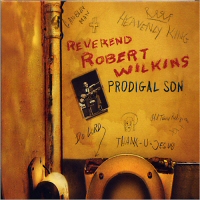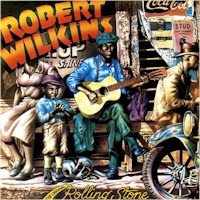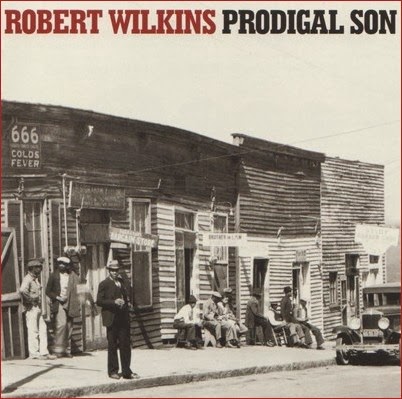Size: 130,9 MB
Time: 55:39
File: MP3 @ 320K/s
Released: 1964/2014
Styles: Blues Gospel, Country Blues
Label: Bear Family
Art: Front
01. Jesus Will Fix It Alright (4:28)
02. Thank You, Jesus (4:52)
03. Just A Closer Walk With Thee (3:02)
04. Do Lord Remember Me (4:17)
05. Here Am I, Send Me (2:48)
06. The Prodigal Son (9:57)
07. Jesus Said If You Go (4:10)
08. I'm Going Home To My Heavenly King (2:35)
09. Old Time Religion (4:23)
10. I Wish I Was In Heaven Sitting Down (3:47)
11. It Just Suits Me (3:04)
12. The Gambling Man (3:29)
13. Biographical Statement (4:41)
It is quite obvious to anyone with functioning ears that Mick Jagger and Keith Richards had heard the late-'20s song entitled "That's No Way to Get Along" by the Reverend Robert Wilkins, because the Rolling Stones album track "Prodigal Son" is a direct copy, at least to the point in the road where the imitation of Wilkins' guitar style hits a technical roadblock. Yet the early pressings of the Stones' cover listed the writers as Jagger and Richards, a deception that was only corrected following legal action. According to the Stones, the mistake was inadvertent and happened because the original artwork for the Beggars Banquet album had to be redone. Because a publisher connected with the original Vocalion label had nabbed the actual collecting rights to the song, this unfortunately did not result in a financial windfall for Wilkins. And although he took great advantage of the '60s roots music revival and performed both concerts and new recordings in the absolute prime of his musical power, there is no way that every pimply high school kid who sat around listening to the Stones' "Prodigal Son" actually was lucky enough to get a taste of the real thing.
A mix of Afro-American and Cherokee Indian, Wilkins hailed from De Soto County, MS, famous stomping grounds for Delta blues. His later fight with the powerful Rolling Stones probably didn't seem like much of a hassle compared to what he went through growing up. His father was kicked out of the state due to bootlegging activities. His mother made a better choice with her second husband, the fine guitarist Tim Oliver, who taught his new stepson plenty. Other country blues musicians would come by the house to jam, the source of further musical knowledge hanging in the air. By the time he was 15, Wilkins was performing and making money at dances and parties. He relocated to Memphis with his mother when he was in his early twenties, this simple geographical movement north having the expected effect of an equal mix of the Delta blues and Memphis styles. He has stayed in Memphis ever since, mingling with many of the great blues talents who passed through, including Charley Patton and Furry Lewis. He taught Memphis Minnie a good deal of her guitar style. Wilkins' early performing life included touring with small vaudeville and minstrel shows. In 1928, he met Ralph Peer of the Victor label and was invited to cut four songs. One result of these releases was Wilkins being invited to perform on a one-hour radio program, making him apparently the first black artist to make a live radio appearance in Memphis. Vocalion, a main rival in the "race" records business, dispatched a microphone-toting field unit about a year later, doing the competition better by recording eight new Wilkins songs as the Roaring Twenties roared out. These sessions produced the aforementioned "That's No Way to Get Along," which he himself had no qualms about re-titling "Prodigal Son" on his own new versions of the song recorded in the '60s. The song's status as a hit gave him particular license as its creator to push it heavily during his later career revival and a ten-minute version recorded for the Piedmont album Memphis Gospel Singer is one of the rare masterpieces of extended blues. His first batch of recording activity continued in 1935, when he recorded five more blues songs, backed this time by a second guitarist and a wonderful spoons player. During this year, his philosophy of life went through a radical switch, the catalyst being the casual violence and sleazy atmosphere of one of the typical house party gigs that he played. Apparently, it was enough to make him believe this music really was an instrument of Satan. He joined the Church of God in Christ and became a minister with a speciality in healing and herbal remedies, his wares ranging from gospel to gingko.
Although it seemed like a radical change in lifestyle, the actual musical effects were almost nil. He went on playing guitar exactly the same way, but just stuck to a repertoire of gospel numbers. Often the meat of an old guitar arrangement would be re-cooked with a different broth. The sexy "My Baby" was changed into the devout "My Lord," for example. His efforts in this style hold up well in comparison to the monsters of gospel blues such as Blind Willie Johnson or Blind Joe Taggart, and Wilkins also has the light-fingered steel-string charm of Reverend Gary Davis or Mississippi John Hurt. The continuing guitar workout as a minister meant his chops were in plenty fine shape when he was "rediscovered" in the '60s. A better description would be to say he was lured from the churches back out into the secular concert world. Of all the blues musicians unearthed during this period -- some of whom looked like they had literally been pulled out of the ground -- Wilkins was one of the easiest to find. Based on a rumor that Wilkins had been corresponding with an elderly British blues collector, which he actually hadn't, another blues enthusiast checked the Memphis phone book and found Wilkins' name right there. Hmm, if only finding Blind Joe Death could be so easy. Wilkins performed recorded plenty of gospel material along with the blues, including cutting a full album devoted to sacred songs. The grandson of this great bluesman wrote a biography of Wilkins, entitled To Profit a Man, which was published in Memphis by Museum Publishing in 1995. ~Biography by Eugene Chadbourne
Prodigal Son

•
Gus Cannon - Walk Right In [Stax] •
•
Van Hunt - Blues At Home 1: Recorded In Memphis, Tennessee (1976-1978) •
Posted by kamaneOznake: Robert Wilkins, Country Blues
 We are a group of friends from different parts of the world which has one important thing in common, our love for the blues. We are here to promote blues and blues musicians who we think deserve more attention and that is the only purpose of this blog.
We are a group of friends from different parts of the world which has one important thing in common, our love for the blues. We are here to promote blues and blues musicians who we think deserve more attention and that is the only purpose of this blog.


